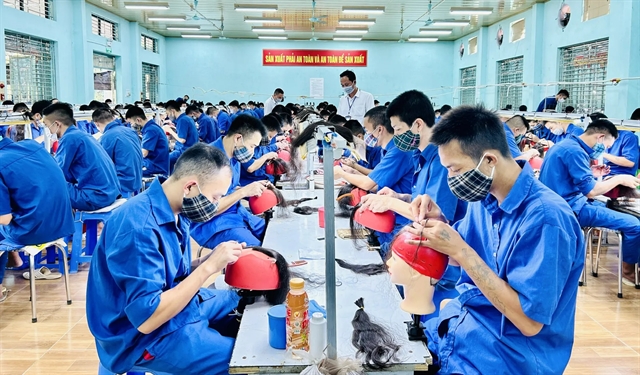 Politics & Law
Politics & Law


|
| General Lương Tam Quang, Minister of Public Security, presents the draft revised Law on Drug Prevention and Control on Tuesday. — VNA/VNS Photo |
HÀ NỘI — Việt Nam's National Assembly on Tuesday began discussing revisions to the country’s Law on Drug Prevention and Control, as officials acknowledged shortcomings in how the 2021 law has been enforced and called for a more flexible, supportive approach to addiction and rehabilitation.
Minister of Public Security General Lương Tam Quang presented the revised draft on behalf of the Prime Minister, while Nguyễn Đắc Vinh, Chair of the NA Committee for Culture and Social Affairs, delivered a review of the proposal.
Minister Quang said that despite progress since the law came into effect three years ago, "a number of obstacles and inconsistencies" had emerged in its implementation.
The revisions, he said, are designed to improve oversight of drug-related activities and strengthen the management of rehabilitation and post-rehabilitation programmes, now under the Ministry of Public Security’s authority.
The proposed law retains the same regulatory scope as its predecessor but adds one new article, bringing the total to 53. It revises or supplements 28 existing articles, adds seven new ones and removes nine from the 2021 statute.
It also amends provisions of the Law on Handling of Administrative Violations.
Minister Quang stressed that the draft "does not expand the state apparatus or add payroll costs," and that revisions had incorporated feedback from the National Assembly’s Standing Committee, which reviewed the bill in August.
Key changes
The new draft aims to tighten control over the legal trade in drug precursors while providing clearer guidelines for addiction treatment, including voluntary and compulsory rehabilitation.
It also refines the division of powers between local police chiefs and provincial authorities to align with Việt Nam’s two-tier local government structure.
Among the most debated proposals are changes to the length and process of rehabilitation.
Lawmakers broadly supported longer rehabilitation periods to improve outcomes but urged flexibility: no more than 24 months for first-time cases and 36 months for repeat cases.
For voluntary treatment at home or in the community, they also called for flexible timeframes better suited to that setting.

|
| Rehabilitation trainees at a treatment centre learn to attach wigs to mannequins as part of an occupational therapy programme. — Photo kinhtedothi.vn |
The committee also urged clearer rules for voluntary rehabilitation, including standards for facilities, pricing and the responsibilities of service providers.
For minors aged 12 to under 18, it supported compulsory rehabilitation in reformatory schools but said the law should allow treatment in other certified facilities where appropriate.
In its report, the Committee for Culture and Social Affairs endorsed the need for reform but urged the Government to balance enforcement with compassion.
The law, it said, should ensure "strict and timely action" against illegal drug use while safeguarding the rights of children, students and other vulnerable groups to education and community reintegration.
The committee called for stronger coordination among ministries, clearer accountability for drug control agencies and more resources to support rehabilitation and post-treatment programmes.
It also emphasised the role of families, communities and civil organisations in helping recovering addicts rebuild their lives.
Lawmakers are expected to continue refining key sections before the bill returns for further debate.
Specific articles on precursor management, administrative measures and inter-agency coordination will undergo additional revision to ensure what the committee described as "consistency, feasibility and clarity" in implementation.
If adopted, the amended law would mark Việt Nam’s most comprehensive overhaul of its drug policy in years, one that seeks to reconcile the country’s tough stance on narcotics with a growing recognition that effective rehabilitation requires more flexibility, support and compassion. — VNS




